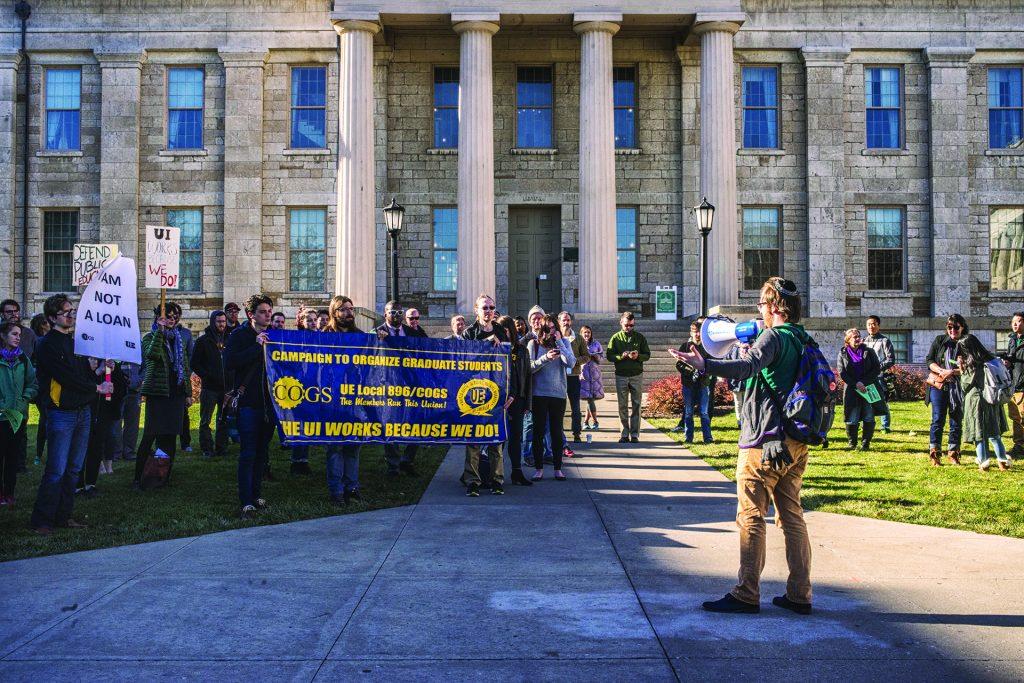COGS and faculty members gathered on the Pentacrest Nov. 29 to protest the proposed Tax Cuts and Jobs Act.
By Tian Liu
[email protected]
Those protesting on the Pentacrest were filled with passion on Nov. 29 about legislation that would increase the cost of education for graduate students. The bill is potentially up for a vote in the Senate later this week.
The Campaign to Organize Graduate Students and University of Iowa students and faculty members gathered on the Pentacrest to protest the proposed Tax Cuts and Jobs Act on Nov. 29.
The provisions of the bill would result in an estimated 145,000 graduate students across the country facing higher taxes.
“[If the bill passed], tuition coverage from the university would count as tax cost,” said Landon Elkind, financial officer of UE Local 896/COGS. “If it does count, students would need to pay more taxes.”
Normally, graduate students who work for a university receive a stipend to cover their living expenses and a tuition waiver or scholarship from the university.
A letter from COGS, the Graduate and Professional Student Government, and the UI Graduate Student Senate said, “This reform means that a typical graduate student at the University of Iowa could, on a stipend of about $19,000, be responsible for nearly $30,000 in taxable income.”
The university presidents from the UI, Iowa State University, and the University of Northern Iowa sent a letter to the Iowa congressional delegation delineating concerns about the proposed provisions.
“Of the utmost concern for us are the provisions that will have the biggest impact on our students and their families,” the letter said. “The House’s proposal to eliminate the Student Loan Interest Deduction and the Lifetime Learning Credit is concerning because of the negative impact this would have on students’ ability to finance their education.”
RELATED: Senate, House propose tax reform
The provision would affect more than 8,000 graduate and professional students across Iowa’s public universities, the letter said.
Additionally, the letter said, the legislation would inhibit the universities’ ability to issue advanced refunds to refinance debt at lower rates. Currently, interest on advanced refunding bonds issued by the regents is tax-exempt so long as the proceeds are used to refinance outstanding tax-exempt bonds, according to the statement. Since 2012, regent institutions have saved more than $63.7 million under the current laws.
Graduate Assistant Amanda Lewis, a fourth-year Ph.D. student in the Psychology Department emphasized the value of graduate students in the higher-education system.
“We came here because we knew we had something to contribute,” Lewis said. “Without the graduate university system, we all can’t do it.”
The letter from the Graduate Student Senate, GPSG, and COGS pointed out, “Additional expenses would discourage domestic and international applicants from U.S. universities in favor of less-expensive programs abroad, or exclude them from graduate education altogether.”
Scott Olson, UE Local 896/COGS labor solidarity committee chair, said because of the high cost of higher education, it’s possible that only people from wealthy families might be able to pay for the cost in the future.
“The diversity we get from the graduate body would go away,” he said.
To prevent this from happening, Bailey Kelley, president of UE Local 896/COGS, encouraged people to contact Sens. Chuck Grassley and Joni Ernst, R-Iowa, or any senators from their home states they have connections to, to fight the bill.
“We are here to support and protect workers of all types,” Kelley said. “It’s not just us. Here are all kinds of workers, not just us. We need you to take an extra step.”



